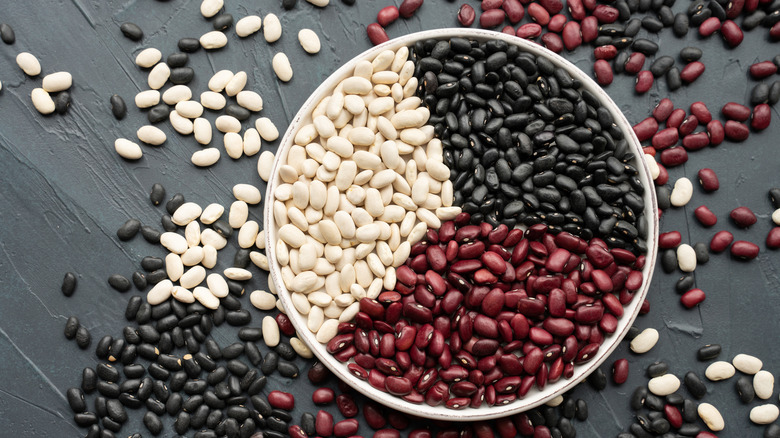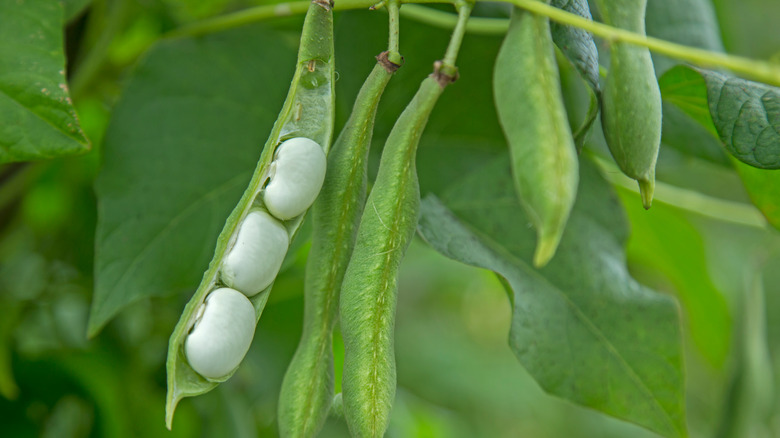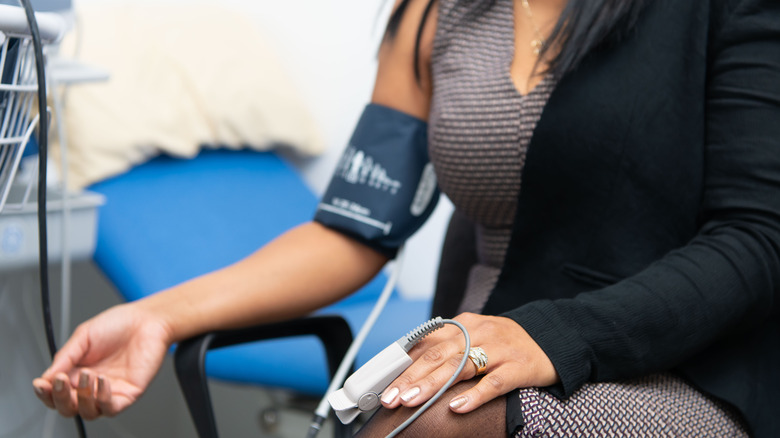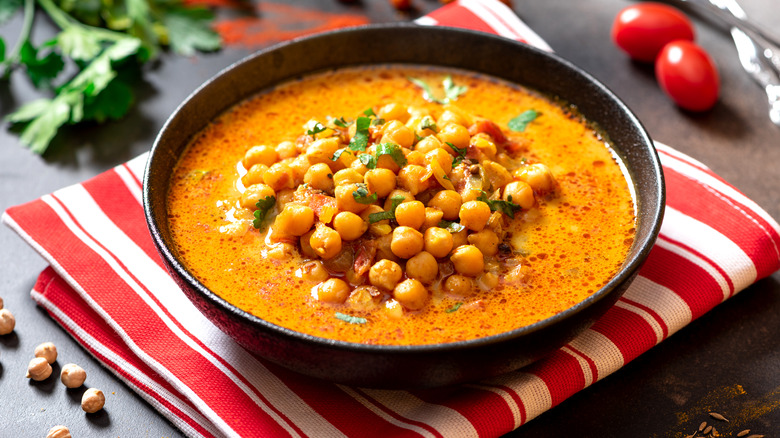Surprising Side Effects Of Eating Beans Every Day
Beans are seasonal bloomers and are among the most common foods consumed throughout the world. They are the fruits or seeds of Fabaceae plants — the most prominent family of angiosperms called legumes (via Britannica).
Beans are one of the least demanding, fastest, and easiest vegetables to grow. In fact, you can grow them right there in your home, as they require minerals that can be found in abundant quantities in any garden such as nitrogen, potassium, phosphorus, calcium, manganese, and iron. A simple search query on YouTube will reveal numerous results about how to grow beans in your own garden or balcony. Beans require consistent moisture, warm soil, as well as roughly six to eight hours of sunlight a day. The period of growth is different for each type of bean. Considering how easily they can be grown and stored, beans are a common commodity in the market.
For vegetarians, beans can prove to be a great substitute for protein obtained from meats (via Healthline). Yes, beans are popular! But does eating beans every day lead to potential side effects? Before we explore this question, let's look at some of the benefits of eating beans regularly.
Health benefits of eating beans
Beans are nutritious. According to WebMD, they are rich in fiber, protein, magnesium, iron, potassium, zinc, and folate. Among several types of beans, the most common are red beans, kidney beans, blackeye beans, soybeans, and navy beans (via US Dry Bean Council).
Eating beans regularly can help reduce the risk of cardiovascular conditions or heart attack. According to research published in The FASEB Journal, the daily intake of beans reduces cholesterol levels in the blood, which might be a potential cause of cardiovascular problems.
There are several more health benefits to beans as well. According to a 2015 study published in Food Research International, the antioxidant and anti-inflammatory properties of beans may help fight intestinal cancer. Another 2016 study suggests that consuming Northeast China black beans daily can decelerate the growth of colorectal cancer (via BBA Molecular Cell Research). Research also suggests that making navy beans and black beans a regular part of your daily diet can help improve your gut health by enhancing the body's number of beneficial bacteria (via The Journal of Nutritional Biochemistry).
Beans can give you gas
Yes, beans have numerous benefits, but some of those benefits are accompanied by some rather unpleasant side effects, some of which could become more apparent if you were to eat beans every day. The one that comes to mind first is the one that we all learned about in that song from childhood, which went, "Beans, beans, they're good for the heart. The more you eat, the more you...," well, you get the picture. And yes, it's true, eating beans can leave you feeling gassy, per Healthline. The real reason beans give you gas is that they contain a non-digestible carbohydrate (i.e. fiber) known as raffinose. Generally speaking, the stomach and small intestine aren't particularly adept at digesting raffinose. So whereas some other foods are fairly well digested by the time they get to the large intestine, beans are not. So when the beans arrive in the large intestine, they wind up fermented by that organ's hard-working colony of gut bacteria, per National Institutes of Diabetes and Digestive and Kidney Diseases.
As the beans ferment in your microbiome, gas bubbles are produced, which can create feelings of pressure and/or bloating and an impulse to pass said gas. Fortunately, your body becomes better at dealing with fiber over time, which means that you may be able to avoid the worst of the gassy feelings if you introduce beans into your diet gradually (per Healthline).
Beans can make you gain or lose weight
Eating beans supports cardiovascular health by promoting healthier blood cholesterol levels, according to the American Heart Association. Another way that beans can support your cardiovascular health is by supporting your efforts to get to and maintain a healthy body weight, per Bean Institute. "If you make it a habit to eat beans, you're more likely to have a lower body weight, slimmer waist, and a lower body mass index (BMI)," according to WebMD. But why is this? Well, while their protein content alone can be a powerful tool in your weight control efforts, beans have the added benefit of fiber (which animal protein does not contain) — and fiber can leave you stomach feeling more satisfied for longer.
That said, as satisfying and filling as beans are, and as nutritious as they may be, they are also densely caloric, according to Livestrong. This may be a boon if you're trying to gain weight, especially if you incorporate them into your diet alongside other healthy, high-calorie foods.
Some beans can cause allergic reactions
As with many foods, beans provoke allergic reactions in some people. And while you might think you'd know by now whether you're allergic to any particular bean, the fact is that although the vast majority of new food allergy diagnoses are made in childhood, it's possible to develop a new allergy to a food you've been eating your whole life up until that point — at any age, per OSF HealthCare. Further, whereas children may outgrow their food allergies, adult-onset food allergies are rarely outgrown.
Fortunately, while legumes like beans can cause allergic reactions, bean allergies aren't common (via Family Allergy Asthma & Sinus Care). The bean perhaps most commonly associated with allergic reaction is a soybean (via Food Allergy Research & Education). And if you're allergic to soy, that raises the likelihood that you're also allergic to peanuts. The reverse is not true, however — most people with peanut allergies aren't bothered by soy. But if you're allergic to peanuts, that does raise the likelihood that you're allergic to lupin beans, another legume (via Food Allergy Research & Education).
Some beans may trigger migraine headaches
Back in 1967, a research scientist published a preliminary report on possible between migraine headaches and a natural substance known as tyramine. Today, it is commonly known among scientists in the field of both neurology and nutrition that tyramine can trigger migraine headaches, per Live Science. "Foods that contain tyramine may trigger headaches in migraineurs by facilitating a chain reaction which results in selective cerebral vasoconstriction followed by rebound dilation of the cranial vessels (the most common cause of the throbbing headache pain)," according to the National Headache Foundation. They add, "This sequence of events is implicated in [the genesis of] migraine headache."
Certain types of beans as well as other legumes are rich in tyramine, according to registered dietitian Kathrynne Holden (via PRD-Medweb). The legumes to watch out for if you're prone to migraines are fava beans, navy beans, and pinto beans (as well as peanuts, lentils, and peas).
The tyramine in some beans can interact with certain prescription medications and supplements
Some beans, like fava and broad beans, contain high amounts of an amino acid called tyramine that may interact with certain medications (via Livestrong). For people taking those drugs, it may be prudent to avoid eating beans, or at least to avoid consuming those beans that are richest in this substance.
For example, certain antidepressants known as MAOI inhibitors are known to interact with foods high in tyramine, according to 2005 research published in the Journal of the American Dietetic Association. Since that interaction may cause a hypertensive crisis — a spike in blood pressure that can lead to a life-threatening stroke, per Colorado Nutrition Counseling – if you're taking MAOI inhibitors, we recommend checking with your doctor about whether or not you should be eating beans.
Another medication that may cause hypertensive crisis when taken with tyramine-rich foods include the antibiotic linezolid (brand name: Zyvox). Although parygline hydrochloride (Eutonyl), is used for treating high blood pressure, it too can cause a hypertensive crisis when taken with tyramine-rich foods. So too can procarbazine hydrochloride (Matulane), which is used to treat advanced Hodgkin lymphoma, according to Colorado Nutrition Counseling. In addition, the body may become overloaded with tyramine if someone who takes tyramine in supplement form (it's a common ingredient in fat-loss supplements) eats high-tyramine foods in addition.
The tyramine levels in some beans can trigger high blood pressure
Generally speaking, consuming beans is recommended by nutrition experts as part of a heart-healthy diet. However, those who have been diagnosed with high or borderline-high blood pressure may wish to approach bean consumption with some level of restraint, according to WebMD.
The connection between beans and elevated blood pressure is tyramine, as tyramine can prompt the release of norepinephrine in the body. Norepinephrine is one of the hormones involved in the fight-or-flight instinct, according to Cleveland Clinic, and it has the effect of increasing blood pressure and speeding up the heart rate. In fact, norepinephrine is sometimes prescribed on an emergency, short-term basis for people whose blood pressure has dropped dangerously low.
Although high blood pressure is known for its relative dearth of associated symptoms, there are some common signs of a sudden increase in blood pressure, according to WebMD. These are "headaches, nausea, sweating, rapid heart rate, chest pain, [and/or] shortness of breath." If you find yourself with any of these symptoms after eating beans, WebMD advises you to seek immediate medical attention.
The purines in beans could trigger gout
It used to be that gout was known as a disease that mostly the privileged class had to worry about, as the chronic inflammatory condition is associated with diets that are rich in meat and seafood — dishes that were, in the past, more readily available to the privileged class via (via The New York Times). Nowadays, it is well-understood that meats and seafood are associated with gout due to their high levels of purines. Purines are chemical compounds that the human body metabolizes into uric acid (via Arthritis-Health), and uric acid in turn can form painful crystals that lodge near the joints. An excess of uric acid happens to be one of the criteria — and an objective one at that — by which gout may be diagnosed, per News Medical Life Sciences.
As it turns out, some beans are also high in purines. According to SF Gate, these include black-eyed peas, great northern beans, small white beans, and soybeans. That said, the purine levels in these beans is still less than that in meat and seafood. Further, a 2012 study published in Nutrition, Metabolism, and Cardiovascular Diseases and a 2015 study published in Arthritis & Rheumatology both suggest that the purines in beans have less of an effect on uric acid buildup than those in meat and seafood — making a limited volume of beans a better choice for gout patients than meat and seafood, all other things being equal.
How often should you eat beans, and which kinds are best?
There's lots of information out there touting the benefits of eating beans, per WebMD. Nevertheless, eating your fill of beans each day could come with some negative health consequences, including possible weight gain, migraine headache, high blood pressure, and interactions with various drugs, not to mention uncomfortable gassiness. Accordingly, as a matter of caution, you might want to limit your bean consumption to one to three cups a week, which is actually all that nutrition experts usually recommend, per WebMD. How you distribute them over the days of your week is really up to you, however.
Some of the healthiest beans you can eat include black beans, chickpeas, kidney beans, navy beans, pinto beans, and soybeans, per Medicine Net. Each of these has its own unique nutritional profile, so which beans you choose to include in your daily or weekly diet will depend on your individual needs. If you have any particular questions or concerns about incorporating beans into your diet, be sure to consult your healthcare professional.










